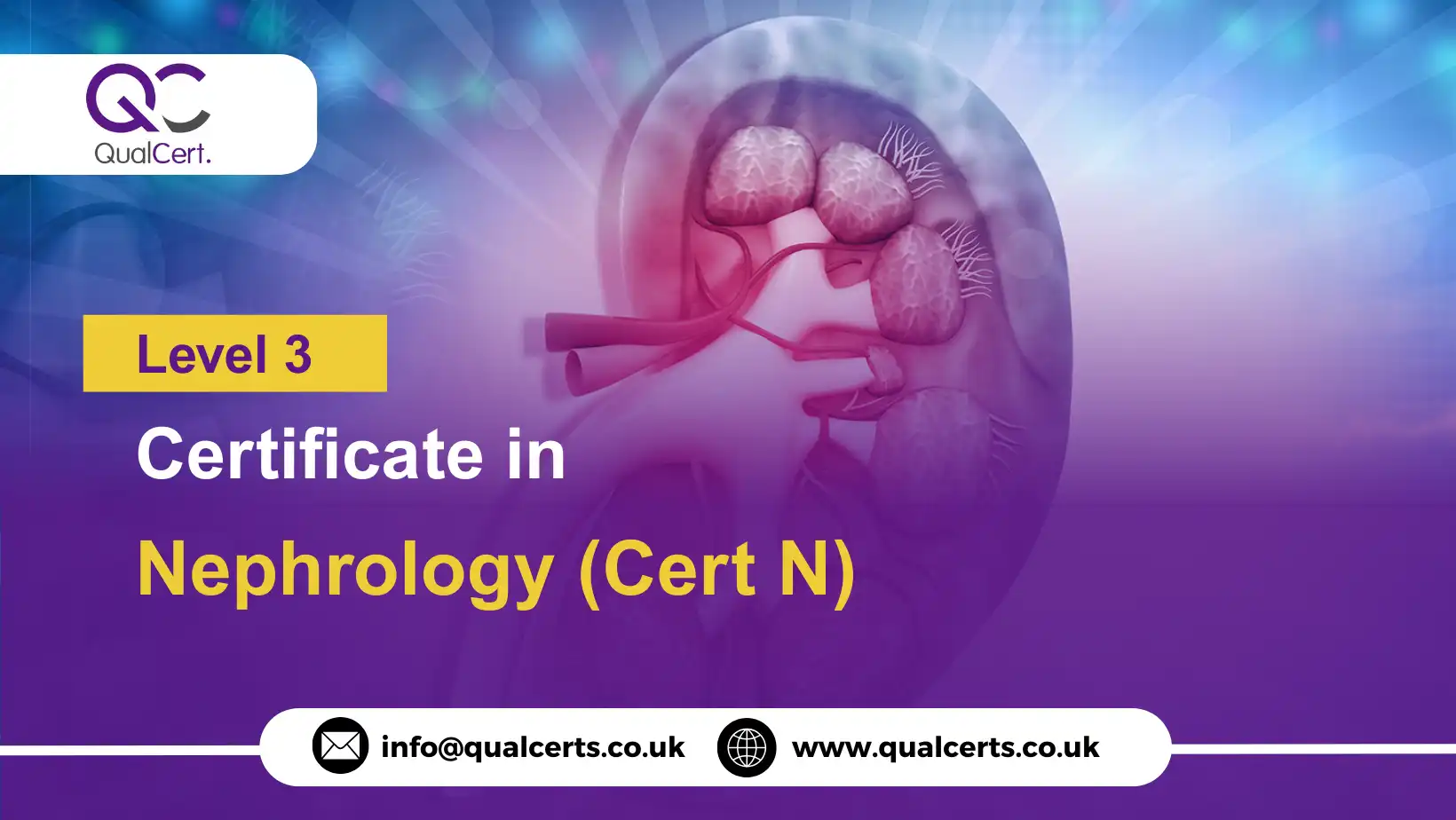The QualCert Level 3 Certificate in Nephrology (Cert N) is a specialised healthcare qualification designed for professionals seeking to develop in-depth knowledge and practical skills in kidney health, renal disease management, and patient care. This course provides learners with a comprehensive understanding of nephrology principles, diagnostic techniques, treatment approaches, and professional practice within renal healthcare settings.
Nephrology is a vital medical discipline focused on the prevention, diagnosis, and management of kidney diseases, including chronic kidney disease, acute kidney injury, glomerulonephritis, and other renal disorders. The Level 3 Certificate in Nephrology equips learners with the knowledge to support clinical assessments, implement care plans, and contribute effectively to multidisciplinary healthcare teams.
The course curriculum covers essential topics such as renal anatomy and physiology, common nephrological conditions, diagnostic assessments, patient care procedures, and professional and ethical standards. Learners will develop practical skills in monitoring patients, administering treatment protocols, and promoting patient education and self-management for kidney health. Emphasis is placed on evidence-based practice, patient safety, and adherence to UK healthcare regulations.
This qualification is suitable for a wide range of healthcare professionals, including nurses, healthcare assistants, renal technicians, and allied health practitioners. It is also ideal for individuals aspiring to specialise in nephrology or advance their careers in renal care services.
Completing the QualCert Level 3 Certificate in Nephrology provides a recognised UK qualification that demonstrates competence, enhances professional credibility, and supports career progression in nephrology and renal healthcare. Participants gain both theoretical knowledge and practical skills that can be applied directly in clinical settings, contributing to high-quality patient care and effective management of kidney-related conditions.
Course Contents of QualCert Level 3 Certificate in Nephrology (Cert N):
The QualCert Level 3 Certificate in Nephrology (Cert N) , offers 20 Credits, requiring a Total Qualification Time (TQT) of 100 hours, including 70 Guided Learning Hours (GLH).
| Unit Ref# | Unit Title | Credit | GLH | TQT |
| QC27099-1 | Renal Anatomy and Physiology | 4 | 14 | 20 |
| QC27099-2 | Common Nephrological Conditions | 4 | 14 | 20 |
| QC27099-3 | Diagnostic Assessment in Nephrology | 4 | 14 | 20 |
| QC27099-4 | Patient Care and Clinical Management in Nephrology | 4 | 14 | 20 |
| QC27099-5 | Professional Practice, Ethics, and Safety in Nephrology | 4 | 14 | 20 |
Entry Requirements for the QualCert Level 3 Certificate in Nephrology (Cert N):
Minimum Age
- Learners must be at least 18 years old at the time of enrolment
- Ensures participants have the maturity to engage in clinical learning and professional practice
Educational Background
- A Level 2 qualification in Health and Social Care, Science, or a related subject is recommended
- Relevant qualifications may include GCSEs, BTECs, NVQs, or equivalent certificates in science or healthcare
- Provides foundational knowledge in anatomy, physiology, and basic medical concepts
Experience
- Previous experience in healthcare, renal care, or clinical support roles is desirable but not mandatory
- Experience can include roles such as healthcare assistant, nursing support, or work placements in renal or clinical settings
- Practical exposure helps learners understand patient care, clinical procedures, and professional conduct
Language Proficiency
- Proficiency in English is essential for effective communication and comprehension of course materials
- Learners may need to provide evidence of English competency through GCSE English, IELTS, or an equivalent recognised qualification
- Strong language skills support accurate reporting, patient interaction, and safe clinical practice
Learning Outcomes for the QualCert Level 3 Certificate in Nephrology (Cert N) :
Renal Anatomy and Physiology
- Understand the structure and function of the kidneys and urinary system
- Explain the physiology of renal filtration, fluid balance, and electrolyte regulation
- Recognise how anatomical and physiological systems relate to kidney health and disease
- Identify key organs and mechanisms involved in renal function
Common Nephrological Conditions
- Identify and describe common kidney and urinary tract conditions
- Understand the causes, symptoms, and progression of renal diseases
- Differentiate between acute and chronic kidney disorders
- Explain the impact of kidney conditions on patients’ overall health and daily life
Diagnostic Assessment in Nephrology
- Conduct basic patient assessments and interpret findings under supervision
- Understand the use of laboratory tests, imaging, and functional evaluations
- Apply knowledge of symptoms and clinical presentations to support decision-making
- Maintain accurate and detailed patient records
Patient Care and Clinical Management in Nephrology
- Apply safe and effective patient care practices in nephrology settings
- Support fluid, electrolyte, and medication management
- Assist with dialysis procedures and patient monitoring
- Communicate effectively with patients and multidisciplinary teams
- Promote patient education and self-management for kidney health
Professional Practice, Ethics, and Safety in Nephrology
- Understand professional standards and ethical principles in nephrology practice
- Apply clinical governance and risk management strategies
- Implement health and safety protocols in clinical settings
- Promote patient-centred care and informed consent in all interactions
This course is suitable for individuals seeking to specialise or advance their career in nephrology, including:
- Nurses and healthcare assistants working in renal or nephrology departments
- Renal technicians and allied health practitioners seeking specialised skills
- Individuals aspiring to start a career in nephrology or kidney healthcare
- Professionals aiming to improve patient assessment, management, and dialysis support
- Those seeking a recognised UK qualification to enhance career prospects and professional credibility
Centres delivering this qualification are expected to:
- Hold accreditation or approval to deliver UK vocational healthcare qualifications
- Employ qualified trainers and assessors with experience in nephrology or healthcare practice
- Maintain appropriate facilities and access to clinical training resources
- Provide structured learning materials, including textbooks, digital content, and clinical guidelines
- Implement robust health and safety, safeguarding, and quality assurance policies
- Offer structured support, mentoring, and assessment feedback to learners
- Maintain accurate records of learner progress and assessment outcomes

